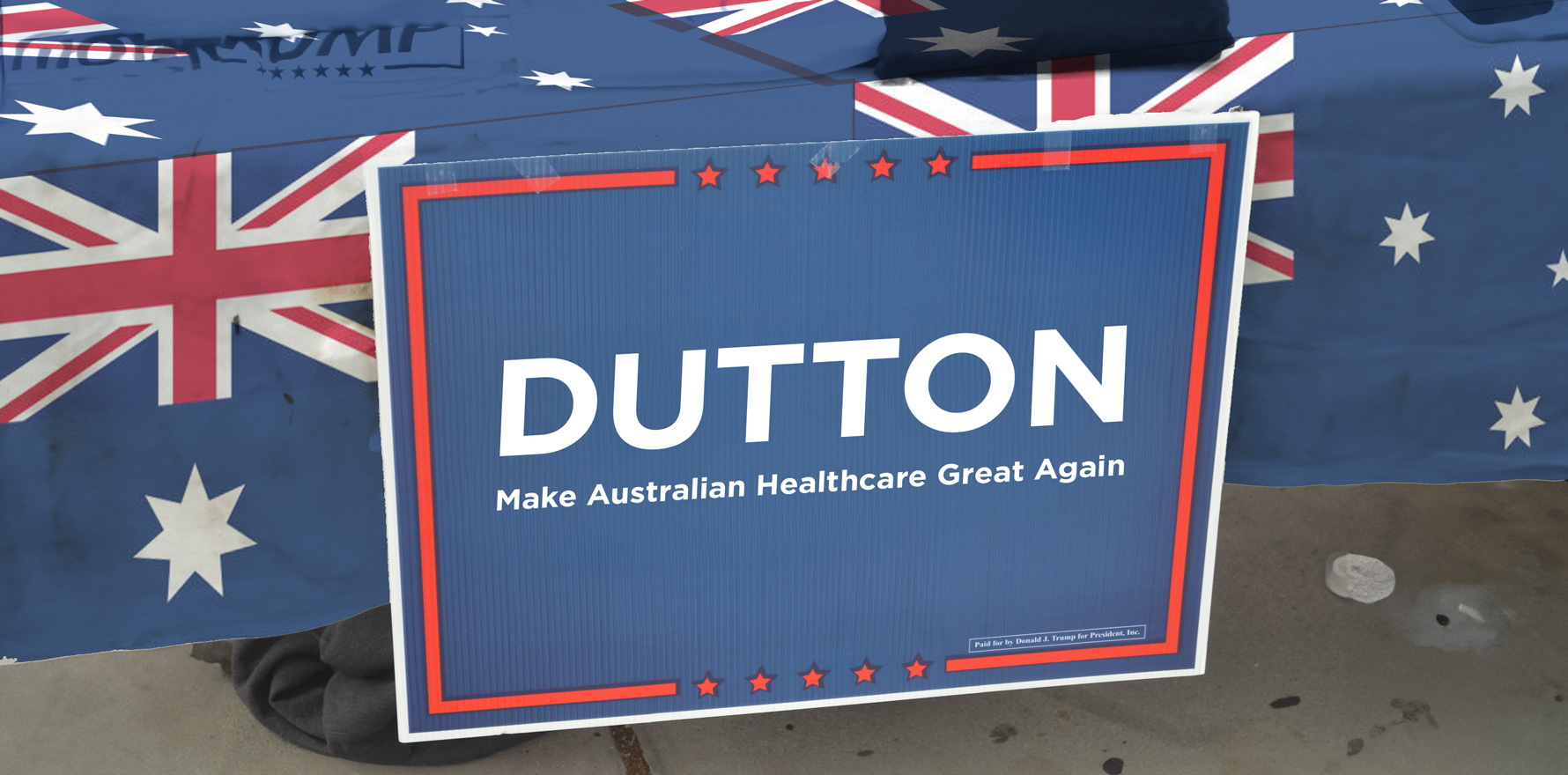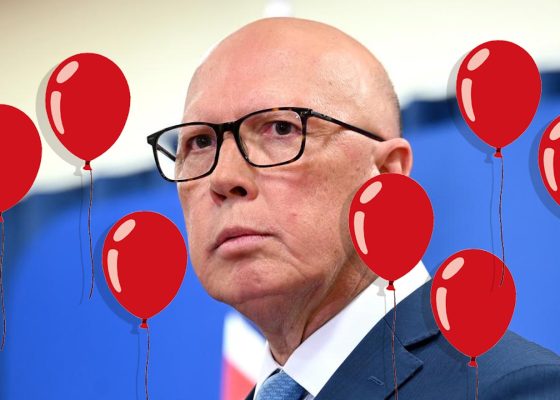As yet, neither party has staked the ground on healthcare and GPs in the manner they both need to if they are taking any notice of what just happened in the US.
The alarm bells ringing about the Coalition and healthcare policy should have peak organisations for GPs and other key healthcare sector advocates a lot more worried than they seem to be.
So far the Coalition thinks it’s fine to have no real policies (what they have so far is listed in our story in TMR’s sister publication, Health Services Daily here – it’s free to access) and rely on publishing negative platitudes and disinformation about bulk billing and the government’s track record.
A big worry here is that Labor won’t see the need for a “Bruce Highway” moment in health electioneering. On 3 January Prime Minister Anthony Albanese gazumped the Coalition badly by committing to an investment of $7 billion to upgrade the dilapidated major coastal highway in Queensland.
It was the first big campaigning coup of the election. The Coalition came out and matched the funding promise but the moment was gone. Labor had notched up a moment in minds of Queenslanders, a state it is going to need to do well in come the election, some time before 17 May.
The Coalition’s policies on health are scant and show a distinct lack of interest or understanding of how our health system has started a critical transition which everyone needs to be careful with. Such a nonchalant approach might tempt Labor to rely on its relatively sound track record of investment in new policy direction over the past few years.
The problem with taking this approach is twofold.
First, the Coalition is fine with running a serial disinformation campaign.
Just this week Senator Anne Ruston told Australian Doctor that “under every metric that you could measure health, the current government has got the worst record”.
“Whether that be an 11% drop in bulk-billing rates since they’ve been in government, or the fact that we have had the greatest or highest level of out-of-pocket costs that have ever been seen before.”
These statements are rubbish.
But who is checking? And, I guess, who cares? It’s easy to say anything and blur what is actually going on in the current media cycle.
Last year Labor spent more on the health system than any other government in the 20 years prior, including a lot on GPs through the tripled bulk-billing incentive and raising the overall bulk-billing rate. The last Coalition government kept GP rebates frozen for every year of its 10-year term. It’s impossible to reconcile a statement saying that on “every metric” the government is “the worst on record”.
Senator Ruston’s 11% bulk-billing headliner is disinformation writ large.
Technically, the figure is correct, even perhaps a little understated. But Senator Ruston is comparing the bulk-billing rate during covid, when vaccines were rushed to the population and had to be bulk-billed en masse. Therefore the bulk-billing rate skyrocketed for a period to nearly 92%.
It’s not a meaningful comparison. it’s a political one.
Bulk billing has dropped under Labor, of course, and by something like 7-8%, but the trigger for this decline was in large part 10 years of a rebate freeze creating a GP sector so financially traumatised that in September 2021, the then-RACGP president made a public call to all GPs to reduce bulk billing and start mixed billing.
A couple of weeks back Senator Ruston published a press release on bulk billing based on the results of a survey from a small for-profit privately run doctor directory company. This was more misinformation (based in ignorance rather than knowing) but the narrative of the flawed survey results was too tempting for Senator Ruston.
The survey made bold statements about numbers of GP practices called (6995 is the claim), but had no baseline data on how many GPs actually answered the call, what questions they were actually asked, no published methodology, and when asked, admitted that of those practices they got through to (it can’t have been many) the questions were asked of the practice receptionist – an employee, not a doctor or owner, who isn’t qualified to answer questions on bulk billing and usually not authorised either.
The survey published bulk-billing rates which bear little relationship to actual Medicare data which is released in full for everyone to check properly, every month.
Senator Ruston didn’t care. She likely didn’t check. She quoted the survey as if it were a valued and respectable long-term reference source. It was a small private company content marketing PR stunt.
Does this necessarily mean the Coalition would be bad for healthcare and the GP sector?
It’s not a good start. But when you add historical decisions and positions on health policy by both Mr Dutton and Senator Ruston it does get quite a bit worse.
Both the Opposition Leader (who was once voted the worst Health Minister in 35 years by Australian Doctor readers – we didn’t exist back then to ask) and Senator Ruston have the worst of track records in understanding health and delivering good policy of just about any politicians still in parliament.
Last week John Menadue published a piece which elegantly laid out some of the history and the likely problem that such a history points to if the Coalition wins.
After promising “no cuts to health” during the 2013 election, the Coalition’s first budget cut healthcare spending by over $6 billion over four years. The cuts included abolishing the National Preventative Health Agency, Health Workforce Australia and GPET.
Mr Dutton and Senator Ruston’s individual positions on Medicare in 2014 have a real air of “tigers don’t change their stripes” about it.
In a 2014 speech Mr Dutton flagged an overhaul of Medicare and said Australians who could afford it should pay more for their healthcare. He said he wanted a frank, fearless and far-reaching conversation about the health system, saying that the current system was unsustainable and that he wanted to “modernise and strengthen” Medicare.
He then introduced the idea of co-payments and that we needed payment models where those that could afford to pay, contributed directly.
Although not perfect, that’s sort of what mixed billing is doing now, but in an emerging pattern of “wrecking” where you can, so far both Senator Ruston and Mr Dutton have run the line that Labor has created a cost-of-living crisis by allowing mixed billing to rise in the overall payments model.
Simple question: if Mr Dutton and Senator Ruston want patients to pay more for Medicare, as they’ve indicated in the past, isn’t that going to contribute to the cost of living of those patients?
What does Mr Dutton really believe now about health given how strongly he stood his ground in 2014 on these matters of policy and that neither he nor Senator Ruston have come out and been explicit about maintaining the current trajectory and commitment to public hospital funding (they cut this in 2014 too), Medicare bulk billing and the PBS?
Senator Ruston famously announced the following to the Senate in December 2014:
“Everybody would like to think that we could go on in life with universal healthcare, with universal education and with all these wonderful things that over the last 20 years Australians have come to accept as a given. Unfortunately, the credit card is maxed out.”
Fast forward to the above press release from Senator Ruston’s office which was replete with false facts and assumptions quoting data from a private internet directory company survey, which suggested trends in bulk billing that don’t exist according to actual data.
Does this sound like someone with an actual dog in the fight of seriously improving our healthcare system for providers and patients?
The press release is lazy.
Quoting 11% bulk billing as a meaningful figure would, under normal circumstances, be stupid.
The thing is, lazy and stupid is politically on trend at the moment.
It seems clear that if Labor plans on resting on its track record of investment in Medicare, its investment outside Medicare in things like urgent care clinics and hospitals, in openly resisting private health insurance’s push to fund general practice for their members (which is against the law currently), and a comprehensive digital health agenda aimed at making the whole system far more efficient, it’s not going to be nearly enough.
The details aren’t important unfortunately in such a febrile electoral environment.
Lazy and stupid can win an electorate over with the right conditions of voter discontent and disinformation.
Lazy and stupid in the US just signed a presidential executive order that will exit the US from the World Health Organization. That single idiotic and self-serving decree has the potential to kill millions of people worldwide come the next pandemic.
Another problem facing peak health bodies and persons of influence in this election is that our healthcare system is fundamentally different to 2014 when both Senator Ruston and Mr Dutton were keen to redo Medicare and get patients to pay a lot more for their care.
It’s been changed massively by covid, the rise of telehealth and the subsequent rapid build out of a non-Medicare privately funded health ecosystem, where most of the rules of Medicare don’t apply.
There is now a rapidly growing market-based (nice term for profit-driven) healthcare provider economy with a lot of growing influence in the system.
Most of these groups – all the private health insurers, who are pushing hard into general practice and want the Health Insurance Act changed so they can fund their members to pay for gap fees; the big telehealth platforms; the vertically integrated monoliths such as Wesfarmers-backed Instant Scripts, the vertically integrated online cannabis providers, and so on – have business models which operate largely outside of Medicare and which naturally align to the core Coalition philosophy of being market driven.
The private health insurers are now pretty clearly buying up general practice networks with a plan that is about leveraging their position in the system for more membership revenue first and continuity of care second.
The big ones answer to shareholders first and patients second unfortunately, as much as they will say their whole strategies are patient-centric. They are to the degree that they are member-centric and members equal revenue and profit. But that unfortunately is not all patients, which is what the government has to worry about.
Mr Dutton is particularly friendly to the private health insurance sector and without him coming out and explicitly saying he’s not going to support private health insurers providing cover for members’ gap fees in general practice, everyone needs to worry.
There are reasonable arguments that PHIs have a place in our funding system but if you cross this Rubicon – and it’s a natural decision for a Coalition government to make based on their pro market-leading philosophies – then we would be setting out on a path to a two-tiered healthcare system, just like the US.
Think this can’t happen?
In 2014 Mr Dutton as the federal health minister came out in support of one our big private health insurers conducting a pilot scheme that was designed to guarantee members priority bulk-billed care.
The trial allowed members to have access to a GP within 24 hours for a standard daytime visit and for after-hours access.
At the time Mr Dutton told the ABC:
“I am interested to see the outcomes of the trial in Queensland and I’m open to involvement of insurers. They cover 11 million Australians, and if they can help keep those people healthy and getting more regular access to primary are that is good for the health system as a whole.”
When you read that quote and examine the Coalition’s so far “low profile” commitment to simply continuing to fund Medicare (a meagre attempt at deflecting a new “Mediscare” campaign) it feels like the Coalition’s tactics are pretty clear.
Deny they are going to gut Medicare, claim that Mediscare is a cynical political tactic and come up with weird emotional and popular one-offs like doubling the number of rebated mental health consultations – something that has statistically been proven to not work.
A big problem here for everyone is that the Coalition doesn’t have to defund Medicare, or even touch it, to denude it and perhaps eventually make it completely unstable.
All they have to do is lean into the rapid rise of the non-Medicare provider economy. And if they get really cocky, change the law so the private health insurers can fund GP gaps for their members.
That’s all market-driven philosophy, and goes to the very public statements from both Mr Dutton and Senator Ruston that we need more “user pays” because the government simply can’t afford to fund Medicare the way it has been.
You might even argue that some software platform providers are eyeing off the opportunity to create health data and information monopolies in the manner that Meta, Google, Amazon, Apple and other global information platforms have, but in health. On spec a Coalition government could easily look to the big emerging private telehealth providers, just as Trump has aligned himself with the giant American tech platforms – a friend and philosophical ally.
It’s not that the private system doesn’t belong in healthcare. The private sector is vital in lots of ways. It’s where innovation mostly comes from and it’s used very efficiently to help implement complex government programs.
It’s just that health is very different beast from other sectors in terms of how private groups can contribute productively.
In the hands of people who don’t even understand where you get the real data for bulk billing, and who proselytise about efficiency, small government and the power of markets, we could all have a very big problem here with balance and the mid- to long-term sustainability of what should remain as a core of the system – Medicare.
Just that one change to the Health Insurance Act could put us on a firm path to the disastrous two-tiered system that exists in the US and has created a healthcare system that costs its people 17% of GDP (compared to our 9%) and is grossly inequitable.
Another key aspect of healthcare that is not going to be apparent to Joe and Betty Punter, or explainable in any way that will get votes, is the transition that the current government has backed in digital health.
Does anyone remember that the last Coalition government actually defunded the Australian Digital Health Agency?
In the last three years that group has done a massive amount on policy and in starting on the implementation of a pretty bold vision of transformation of the underlying infrastructure of system with a view to making health data accessible at all points of the system and to patients in real time (the “sharing by default” protocol).
That same transformation has occurred in the US already with great effect. It has occurred despite a ruinous healthcare system created by hugely dysfunctional funding environment dominated by private health providers, who, you guessed it, fund general practice for their members.
It happened in part because of all the things that the Republicans hate the Democrats for and vice versa. On the topic of the importance of healthcare interoperability to transforming the efficiency and cost base of the system, the two parties have been violently bipartisan on the topic for more than two decades.
It doesn’t feel like the Coalition and Labor are violently bipartisan on healthcare interoperability, for the very simple reason that the Opposition doesn’t understand it.
Talking to persons who have discussed this aspect of the healthcare system with the people that matter in the Coalition, the view is that there is virtually no understanding at all of digital health and what it could do for the system. That might be why the Coalition defunded the ADHA in its last stint in power. They didn’t understand, so they decided to save the money.
To be clear, this is not an op-ed saying don’t vote for the Coalition. Obviously, that’s just not going to happen for a large proportion of long-term glued-on Coalition voters. And depending on how the whole “are you better off than you were three years ago” Coalition campaign, many people who are involved in health might still have personal and family priorities they think trump (pun intended entirely) thinking of the possible implications for health.
No, this is more an op-ed saying, hey, the Coalition do not have the first clue about health, their track record and philosophy look like it could be dangerous for setting us on a path to a US-style system given that the non-Medicare provider economy is now on the rise big time and it will be very attractive to them.
What could everyone do (Coalition and Labor voters alike)?
Two suggested things here, one of which Senator Ruston and Mr Dutton could do if someone sends them this op-ed, but if they did, great, for reasons which will become obvious.
This week the RACGP decided to up the ante on its call for improving the funding of GPs by asking not for 20% but now a 40% increase to the C and D rebate for bulk billing. Our story on that is here. The college has asked for the 20% increase in past elections and been duly ignored by both parties because it’s a lot to ask for in one chunk.
Talking to The Medical Republic, president Dr Michael Wright explained this week that the college had worked with a major consultant to cost the move, including some estimate of system savings and the cost year on year that would be something like $700 million to $1 billion (so let’s say $4 billion in a budget cycle). The identifiable savings to the system through things like reduced hospital admissions would be about $300 million. You could pitch that at only $400 million per year, except no one counts or believes the savings to the system side.
Dr Wright then explained a few things that both parties would do well to think about. Yes, it’s a lot of new commitment and it’s to Medicare but as far as “cost of living and access to a GP” goes and as far as a commitment to strengthening Medicare goes (remember Mediscare, Peter) it should be a home run electoral pitch.
Even if it didn’t turn out to be what Dr Wright is saying it is – even if you up the rebate by this much, you can’t guarantee mixed-billing GPs just won’t take the money now – it’s a policy that does what policies need to do in this era of Trumpian politics:
- It’s simple messaging with an easy to describe cost of living and securing Medicare impact;
- It has lots of upstream nuance if it does grab the electorate;
- It’s entirely defendable and positions who ever does it as the leader in a very important topic for the election.
Oh, there’s also a lot of other good arguments for doing it, which probably wouldn’t even try to go to with the electorate (don’t want to complicate things these days) – like it’s funding long consults like this that nip a lot of complex chronic care patient problems in the bud early and prevent a lot more long-term cost to the system when patients end up in hospitals].
And that female GPs tend to dominate long-term consults, and given they are rebated so low at the moment, such a move would significantly improve the income profile and morale of our female GP workforce.
Trump wouldn’t like that last point. Obviously woke.
The thing is, health is a big potential election lever for either party, if one or the other wants to take the plunge and go for their “Bruce highway” moment.
Both parties committed $7 billion to upgrading the Bruce highway and the first one that came out with it is the party that voters associate with such a big cut-through policy.
We’re only talking a $3 to $4 billion policy commitment tops to lock up the cost of living and secure Medicare argument in health.
If you asked Labor it might rightly say it’s spent more than any government in two decades on health, is doing a lot already and Treasury won’t be happy.
But we aren’t talking about balancing a budget here. We’re talking tactics to win an election in the era of Trump.
The first party to do it will likely get that Bruce Highway effect.
It’s surprising to me that neither has jumped yet on it.
Which brings me to the final point of this op-ed: the Coalition could easily win and it doesn’t feel like any of the major peak provider bodies or key government department heads have had a really good sit down with Mr Dutton or Senator Ruston and explained what is really going on, and what they should understand intimately before letting loose on a system that is clearly in a lot of transition.
It’s going to be way too late to do this after the election. The Coalition will be giddy with success and we know from last week in the US what the extreme of that can look like.
It’s not entirely the fault of Mr Dutton and Senator Ruston that they have no policies and that those they have are mostly weak and disjointed.
It’s at least partly the fault of everyone who is immersed now in building out a better system that an opposition party is going into an election on health with so little understanding of what could go wrong if they tried changing things without a little more core knowledge and understanding of the nuances first.
Someone could even have a go at convincing the Coalition that leaning too far into the rapidly emerging non-Medicare provider economy could easily trip the system to a trajectory that would take us the way of the US.
I’m not sure you’d get very far, but it’s a debate that should at least be had with Mr Dutton and Senator Ruston.
And now.




